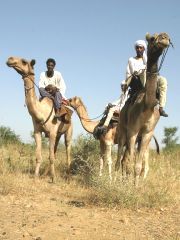They talk peace, but the killing goes on
Sept 26, 2005 (OURE KASSONI, Chad) — Abdarhaman Ghamis left this desert refugee camp at Oure Kassoni, Chad, on a donkey a month ago. He crossed the border into Darfur, Sudan, and rode for six days towards Idda el Khair, where he had left his sheep before fleeing to Chad in 2004.
 He found his livestock. And then the Janjaweed found him.
He found his livestock. And then the Janjaweed found him.
“The Arabs arrived in five cars early in the morning,” said Selake Ghamis, Abdarhaman’s cousin, among 30 mourners gathered for a memorial ceremony. “They shot him dead and took his animals.”
Darfur may have slipped down the West’s agenda, but the killing continues. Time and again faint hopes of permanent peace – the Government and rebels started a sixth round of talks in Abuja, Nigeria, this month – are quashed by a tragically predictable cycle of violence, accusation and denial.
Just one day after the talks started, the Sudan Liberation Army, the main rebel group that provoked the conflict in 2003, said that the Janjaweed – Arab herders armed by the Government to exact revenge on the civilian African population – had killed 30 people in North and West Darfur.
President Omar el Bashir’s Government, which has never admitted its role in the deaths of tens of thousands of Darfurians, blamed bandits.
The following day, an army spokesman said that rebels had killed an unknown number of soldiers and civilians in South Darfur. The African Union, which has 3,000 peacekeeping troops in the region, was unable to confirm either attack. Caught in the middle are the refugees. About 1.8 million people live in camps in Darfur, dependent on food aid. In Chad, a further 200,000 live in 12 refugee camps along the country’s eastern border.
Most camps have enough food and water and the refugees are safe, but few pretend to want to stay. “It’s a giant sandbox out here,” said William Carter, the acting field co-ordinator for the International Rescue Committee, which runs the Oure Kassoni camp, home to about 20,000 people. “They do not think that they have got it good. They want to go home.”
But those brave or foolhardy enough to test the waters – men such as Abbas Ibrahim Gisir, 33, who suffered a similar fate to Abdarhaman in Darfur on September 2, and the women who sneak across the border to plant seeds in their old villages – take their lives in their hands. The rebels may control much of the countryside and the Government the towns in North Darfur, but there are no fixed lines.
If the Government of Sudan had its way, the refugees in Chad would be home. They are a source of major embarrassment, proof of Khartoum’s extermination campaign.
The Government has tried to entice people back. The Sultans of Darfur have been lured to major towns such as Nyala or El Fasher with threats that they would lose their familial titles for ever. In broadcasts and on trips to the camps, they have told the disbelieving refugees that it is safe to return.
Tine, a trading town an hour and half’s drive south of Oure Kassoni, is split by the ChadSudan border. The Sudan sector is a ghost town, home to perhaps only 40 or 50 families. Almost the entire population fled to Chad when their homes were bombed by government Antonovs in 2003.
Mansour Dousa, the Sultan, now lives in Khartoum. He has made two trips back to his home town, the last with Ali Osman Taha, Vice-President of Sudan, where they gave out money and blankets to the few women who showed up. “The Government wants to show that Darfur is safe, but that is not true,” said Hussein Bishara Dousa, 38, Mansour’s nephew and vice-Sultan, who lives in the Chad sector of town. “It wants to cover things up and has put the Sultans in a very difficult position.”
In Oure Kassoni, the refugees are refusing to accept the possibility – some say probability – that they may be in the camp for years to come. Hawa Ahmed, 25, said: “Sudan is our country. We will be going home soon.”
Aid workers say otherwise.
(The Times)
